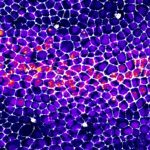Link to Pubmed [PMID] – 37400292
Link to DOI – 10.1016/j.semcdb.2023.06.008
Semin Cell Dev Biol 2023 Jul; ():
Epithelial cell death is highly prevalent during development and tissue homeostasis. While we have a rather good understanding of the molecular regulators of programmed cell death, especially for apoptosis, we still fail to predict when, where, how many and which specific cells will die in a tissue. This likely relies on the much more complex picture of apoptosis regulation in a tissular and epithelial context, which entails cell autonomous but also non-cell autonomous factors, diverse feedback and multiple layers of regulation of the commitment to apoptosis. In this review, we illustrate this complexity of epithelial apoptosis regulation by describing these different layers of control, all demonstrating that local cell death probability is a complex emerging feature. We first focus on non-cell autonomous factors that can locally modulate the rate of cell death, including cell competition, mechanical input and geometry as well as systemic effects. We then describe the multiple feedback mechanisms generated by cell death itself. We also outline the multiple layers of regulation of epithelial cell death, including the coordination of extrusion and regulation occurring downstream of effector caspases. Eventually, we propose a roadmap to reach a more predictive understanding of cell death regulation in an epithelial context.


